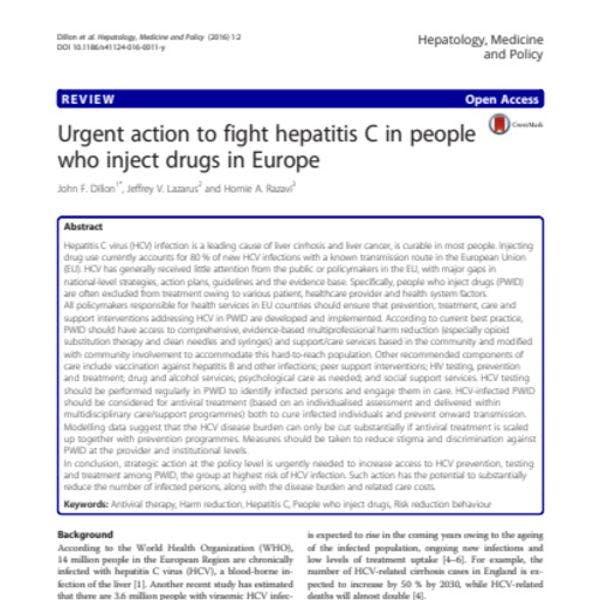Acción urgente para luchar contra la hepatitis C entre las personas que se inyectan drogas en Europa
Es urgente adoptar medidas estratégicas en el ámbito normativo para incrementar el acceso a la prevención, el diagnóstico y el tratamiento del virus de la hepatitis C entre las personas que se inyectan drogas, el grupo que corre un mayor riesgo de infección por este virus.
Más información, en inglés, está disponible abajo.
Suscríbase a las Alertas mensuales del IDPC para recibir información sobre cuestiones relacionadas con políticas sobre drogas.
Hepatitis C virus (HCV) infection is a leading cause of liver cirrhosis and liver cancer, is curable in most people. Injecting drug use currently accounts for 80 % of new HCV infections with a known transmission route in the European Union (EU). HCV has generally received little attention from the public or policymakers in the EU, with major gaps in national-level strategies, action plans, guidelines and the evidence base. Specifically, people who inject drugs (PWID) are often excluded from treatment owing to various patient, healthcare provider and health system factors. All policymakers responsible for health services in EU countries should ensure that prevention, treatment, care and support interventions addressing HCV in PWID are developed and implemented.
According to current best practice, PWID should have access to comprehensive, evidence-based multiprofessional harm reduction (especially opioid substitution therapy and clean needles and syringes) and support/care services based in the community and modified with community involvement to accommodate this hard-to-reach population. Other recommended components of care include vaccination against hepatitis B and other infections; peer support interventions; HIV testing, prevention and treatment; drug and alcohol services; psychological care as needed; and social support services. HCV testing should be performed regularly in PWID to identify infected persons and engage them in care. HCV-infected PWID should be considered for antiviral treatment (based on an individualised assessment and delivered within multidisciplinary care/support programmes) both to cure infected individuals and prevent onward transmission. Modelling data suggest that the HCV disease burden can only be cut substantially if antiviral treatment is scaled up together with prevention programmes. Measures should be taken to reduce stigma and discrimination against PWID at the provider and institutional levels.
In conclusion, strategic action at the policy level is urgently needed to increase access to HCV prevention, testing and treatment among PWID, the group at highest risk of HCV infection. Such action has the potential to substantially reduce the number of infected persons, along with the disease burden and related care costs.
Keep up-to-date with drug policy developments by subscribing to the IDPC Monthly Alert.
